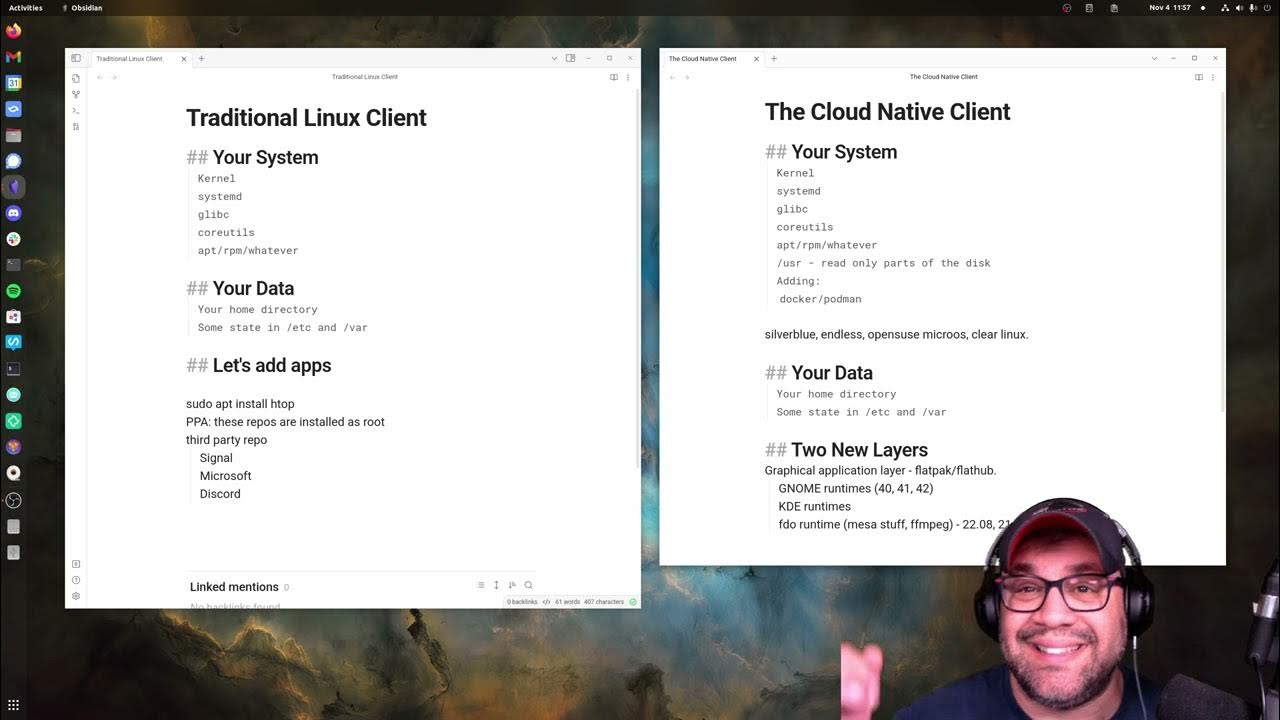I understand the general job market, but what about lisp prevents you from pursuing personal ventures with it?
- 8 Posts
- 18 Comments
Yeah Clojure is like the monkey’s paw of Lisp weenies. It adds many modern day niceties that are lacking in standard Scheme or Common Lisp, but also changes enough things to make it feel very un-lispy. I go back and forth as to whether or not I even consider it Lisp (Richard Stallman doesn’t).
But I do know that I’d rather write Clojure than any other non-lisp language.
I’d also recommend people try ABCL, which is Common Lisp on the JVM , or Parenscript which is Common Lisp that compiles to Javascript.
Lisp
It solves so many problems new languages have been invented to try and solve, while being simultaneously simpler than most
Emacs Orgmode

 3·9 months ago
3·9 months agoemacs org-mode publish
https://orgmode.org/worg/org-tutorials/org-publish-html-tutorial.html
M-% NixOS RET Guix RET !
But yes 80% of my comment applies to Nix as well, as of course Nix is older and Guix is (conceptually) based on Nix. Though I personally use/prefer Guix.
Yes GNU Guix is a linux distro.
The package manager for Guix (also called guix) is also a portable package manager which works on any linux distro, similar to flatpak, nix, homebrew, etc.
Guix’s claim to fame is that it is a functional distro/package manager, meaning that all changes are atomic, so installing/upgrading/deleting packages never leaves your system in a broken state.
Not only that, but if you make some change to your system and it breaks for normal reasons (e.g. newest software version has a bug), you can roll back to your previous system state with all your previous packages and their versions, and this roll-back operation is also atomic.
Guix the distro not only let’s you do package management this way, but also let’s you do declarative system configuration. This means rather than manually rummaging around /etc changing files and hoping nothing breaks, there’s simply a single config file which declares all of your system configuration. From your kernel to users, partitions, system services, and just about anything else, all the configuration is declaratively done in one place with one language (Guile Scheme). Any changes you make to your system this way are also of course atomic and can be rolled back.
It even comes with a built in system called guix home which lets you bring that same level of declarative, atomic configuration to your user’s home environment, letting you manage user level packages, dotfiles, env variables, and more with a single home configuration file.
There are other goodies too, such as the ability to spawn one-off shell environments with the guix shell command, dropping you in a shell with all the packages and env variables you declare, keeping your regular user environment clean (very nice for development).
There’s even more, but at this point if you’re still interested just head over to the site and the docs.

 14·9 months ago
14·9 months agocodeberg
it’s like github but non-corporate free software
it’s very polished and featurful
it’s built upon/by the same devs as forgejo, which is open tech to self host your own git server (with federation potentially coming), so supporting one supports the other
If I understand you correctly, this is trivial in emacs:
(defun insert-text () (interactive) (insert "your text here")) (global-set-key your-keybind-here #'insert-text)You could make it a format string if it relies on data specific to some file or parameter. You could also make the keybind local to certain modes/files rather than a global keybind if you don’t want to pollute your keybind space.

 381·9 months ago
381·9 months agoemacs org-mode

 1·10 months ago
1·10 months agoI’ll never understand why we don’t just use s-expressions.

 2·10 months ago
2·10 months agoguix home reconfigure home-config.scm

 1·9 months ago
1·9 months agoedit: I do feel norawibb’s point, the slippery mutability of Void is something I am a lot less comfortable with than I used to be. Apparently Guix has spoiled me.

 01·1 year ago
01·1 year agoObsidian is not free software?! How could anybody even browsing this community consider obsidian?
I have never used nix or nixos. I liked their shared idea (functional, atomic, reproducible systems), and so when I looked at their differences they seemed to all be pros for guix:
- Clearer, more robust, more centralized documentation
- GNU Project
- Guile Scheme (Lisp) as opposed to Nix DSL
- Unparalleled emacs integration
The only bittersweet aspect of guix compared to nix was the foss only stuff, as I do need some proprietary drivers, but nonguix is so easy it hasn’t been a practical issue. And of course I am big advocate of free software so I like that guix is pushing that forward.
There’s also a theoretical issue that guix has less packages, but the standard channel + nonguix has had everyhing I use.
I quite enjoy it!
Being able to rollback any change I make to the system, either package changes or system configuration, makes it completely unbreakable and provides great peace of mind. It means I can fully enjoy its rolling-release nature without worrying.
Having my entire system configuration declared in a single, robust programming language (Guile) across a small number of files makes it very easy to understand and just stick into source control to reproduce.
Being able to hack on it in a lisp (scheme) is the cherry on top, along with the great emacs integration. I would highly recommend it to any lisp/emacs/gnu enthusiasts.






Common Lisp “solves” most language-level problems by providing metaprogramming capabilities via lisp-style macros. (Almost) any language feature you would want can be implemented with lisp macros, and many such features already have been. So you don’t have to worry whether or not lisp has “for i in…” loops, or pattern matching, or generics, or virtually anything else, because if it doesn’t, you can write it! Plus if it’s really a good feature somebody has probably already made a library for it (if it’s not already part of the standard).
One of the most extensive examples of this is Coalton, which is an ML-style statically typed EDSL for Common Lisp.
There are metaprogramming features in a few other languages: template haskell, C pre-processors, even macros in Rust or Julia. But these all fall very short of lisp-style macros because those languages are not (truly) homoiconic, which makes the macros awkward to write and integrate into the language. This kind of metaprogramming is rarely employed, and when it is only for heavy duty tasks, and even then is generally discouraged as a last resort/special circumstance. But lisp macros are very easy to write because it’s the same as writing any other piece of lisp code. This results in macros being used often for smaller lightweight abstractions in the same way you write a small function.
The other big pro of lisp is image based development. But that’s not so much solving a problem in other languages as it is simply a feature that they don’t (and pretty much can’t) have.
And all of this is done in a language with less syntactic and semantic primitives than almost any other language, including the other “simple” ones like Python, Ruby, Elixir, etc.